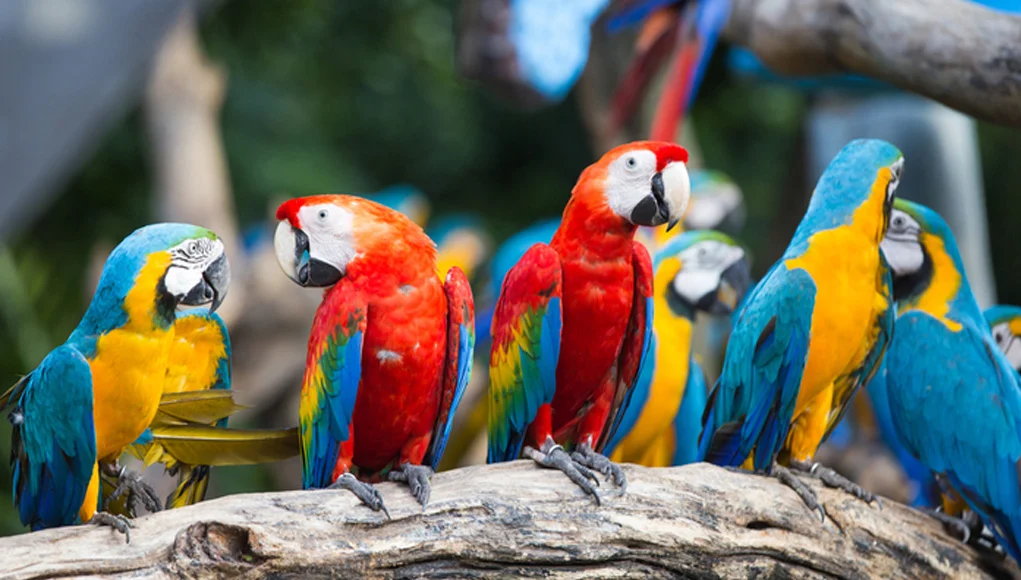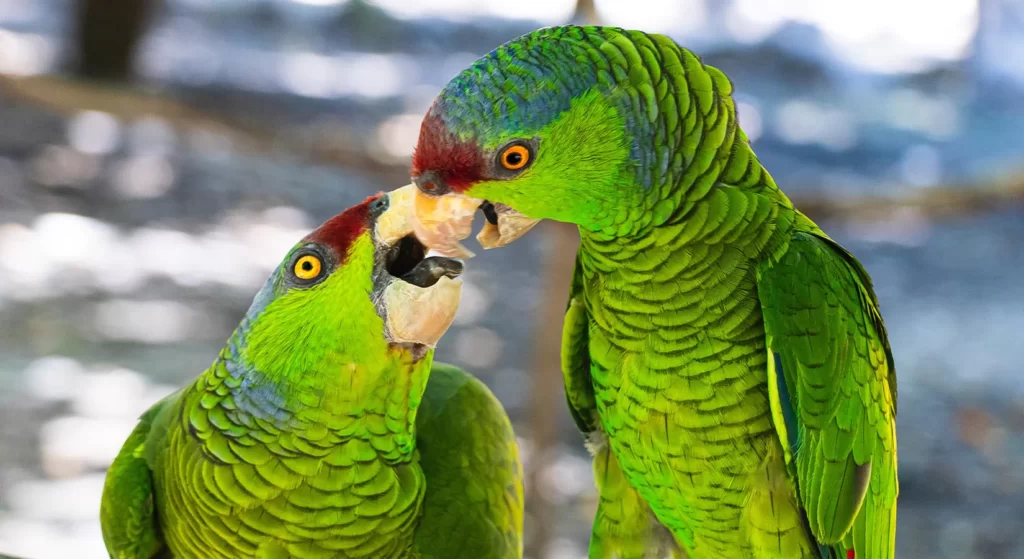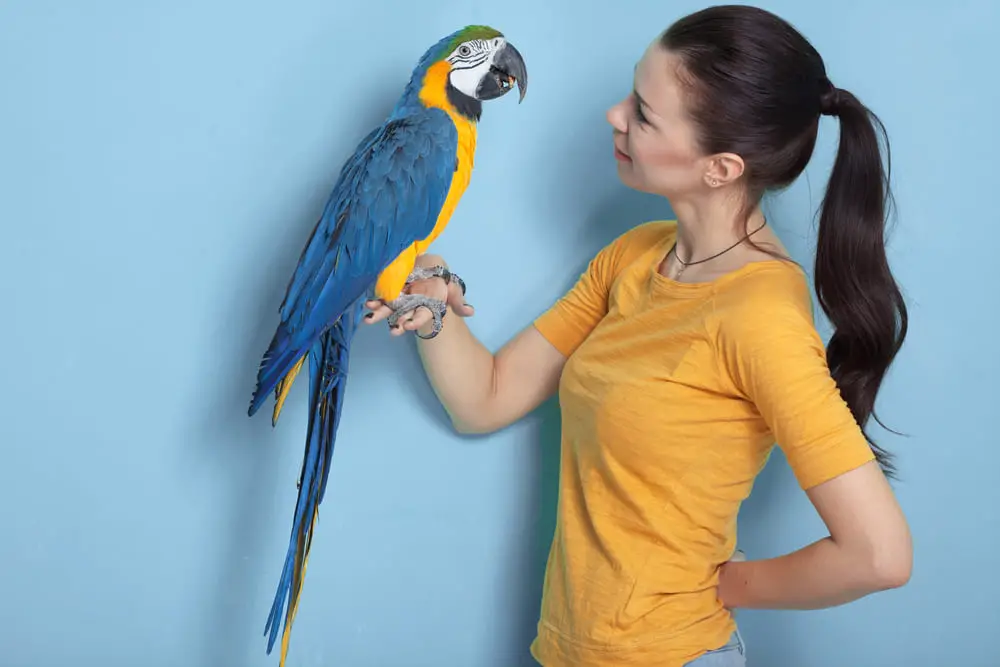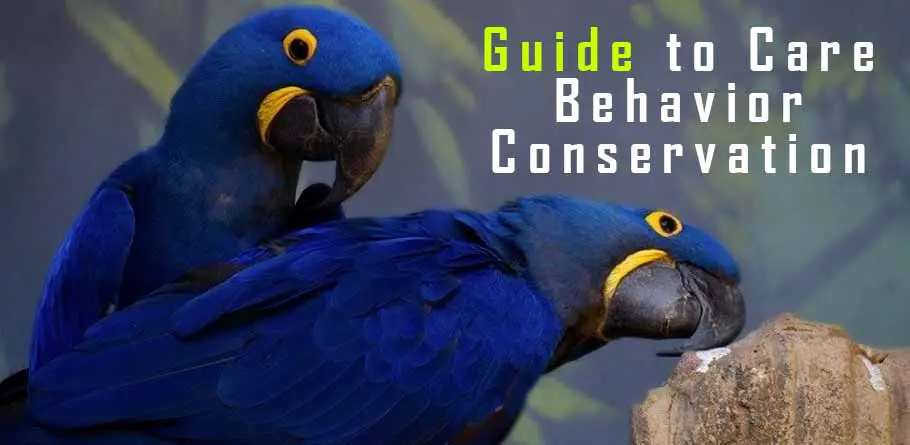Macaw Behavior Perfect Guide! With their vibrant plumage and captivating personalities, Macaw parrots have long mesmerized bird enthusiasts worldwide. Understanding their behavior it is essential for providing them with the care and environment they need to thrive. By delving into the intricacies of their behavior, we can gain a deeper appreciation for these intelligent creatures and provide them with the care and environment they need to thrive. If you want to know the Macaw parrot price in India, click here.
By gaining insights into the behavior of these magnificent birds, we can establish strong bonds, meet their specific needs, and create enriching experiences for them. These majestic birds exhibit complex behaviors that make them truly remarkable. From their social interactions and communication skills to their unique mating rituals, understanding Macaw behavior provides valuable insights into their world.
In this our comprehensive guide, we will delve into the intricacies of Macaw behavior, shedding light on their social interactions, communication skills, mating rituals, and unique qualities as pets. So, please take a deep breath, let your imagination soar, and prepare to embark on an unforgettable adventure as we delve into the captivating and vibrant world of macaw behavior.
Guide For Macaw Behavior
This guide provides overall information on the Macaw Behavior, by social and everyday expectations of their behavior and how to control it, respond to it, and overcome it. Now, let’s start talking step-by-step about the different aspects of macaw behaviors towards others and others.
Social Behavior of Macaw Parrots

Macaw parrots, known for their vibrant colors and captivating personalities, are highly social creatures that thrive on interaction and companionship. These magnificent birds form large flocks in the wild, exhibiting complex social behavior and communication skills. Macaw parrots congregate in flocks ranging from a few individuals to hundreds of birds in their natural habitat. These flocks provide numerous benefits, including safety in numbers, increased foraging opportunities, and enhanced reproductive success. Macaws engage in various social interactions within the flock, displaying a remarkable ability to communicate and coordinate with their fellow flock members.
One notable aspect of Macaw’s social behavior is their loyalty and strong bond with their chosen mates. Macaws are monogamous birds, meaning they form long-term pair bonds. Once a pair bond is established, the male and female Macaw engage in mutual preening, feeding, and vocal exchanges to strengthen their relationship. This bond is vital to their overall well-being and serves as the foundation for successful breeding and raising offspring.
Macaw parrots exhibit various behaviors facilitating social communication within the flock. Vocalizations are crucial in Macaw’s social interactions, allowing them to convey messages to other flock members. Macaws use calls to maintain contact with flock mates, establish territory boundaries, and communicate threats or warnings.
Physical displays and body language also play an important role in Macaw’s social behavior. These striking birds showcase their vibrant plumage, engage in courtship rituals, and perform energetic dances to attract potential mates and strengthen social bonds. These displays serve as visual signals to communicate availability, dominance, or submission within the flock.
In a domestic setting, Macaw parrots rely on their human caregivers to fulfil their social needs. As highly intelligent birds, they seek social interaction, mental stimulation, and companionship from their human counterparts. Macaw owners must spend quality time interacting with their feathered companions, providing them with the required attention, affection, and enrichment.
Communication and Vocalization

These magnificent birds possess various vocal abilities, which they use for various purposes, including social interaction, territory marking, and attracting mates. Understanding Macaw parrots communication and vocalization patterns provides valuable insights into their behavior and enables us to better connect with these fascinating creatures. Vocalizations play a central role in the social interactions of Macaw Behavior. They use diverse calls and sounds to communicate with their flock members, express emotions, and establish their presence within their environment.
Macaws can produce loud squawks, piercing screeches, soft whistles, and even melodic tunes, showcasing their vocal versatility. One of the most remarkable aspects of Macaw Behavior vocalizations is their ability to mimic human speech and other sounds in their environment. This exceptional talent stems from their highly developed syrinx, the vocal organ unique to birds. Macaws can learn to imitate words, phrases, and even entire conversations, often with remarkable accuracy. This mimicry ability, coupled with their intelligence, makes them highly sought-after pets and performers.
However, it is important to note that not all Macaw Behavior possess the same level of mimicry skills. Individual differences in learning and vocalization capabilities can occur, and some Macaws may be more inclined to mimic sounds and speech than others. Macaw parrots also utilize vocalizations for specific purposes within their social groups. They emit contact calls to maintain communication and cohesion within the flock, ensuring that individuals can locate and recognize each other. These contact calls serve as reassurance and help prevent separation and isolation.
Moreover, Macaw Behavior use vocalizations to establish and defend their territories. By emitting loud and distinctive calls, they communicate to neighboring individuals that the area is occupied and should be respected. In addition to vocalizations, Macaw parrots employ various body language and physical displays to communicate their intentions and emotions. They may raise their crests, fan their tail feathers, or perform specific movements and postures to express excitement, aggression, or submission.
Mating Rituals and Courtship

These fascinating rituals attract potential mates, establish pair bonds, and ensure successful reproduction. Understanding Macaw parrots’ mating rituals and courtship behaviors provides valuable insights into their natural behaviors and enhances our appreciation for these magnificent birds. Impressive displays of colorful plumage, vocalizations, and acrobatic aerial movements characterize mating rituals among Macaw parrots. These rituals typically occur during the breeding season when Macaw Behavior are ready to find a suitable mate.
Male Macaws play a prominent role in courtship displays, using their vibrant feathers to capture the interest of females. They showcase their colorful plumage by spreading their wings, fanning their tail feathers, and puffing up their chests. These visual displays testify to their health, genetic quality, and overall fitness, signalling their suitability as a mate.
Alongside their visual displays, male Macaws engage in energetic dances and acrobatic aerial maneuvers to impress potential mates. They fly back and forth, performing loops, twists, and turns, demonstrating their agility and physical prowess. These aerial displays not only showcase their strength but also display enthusiasm and vigor, captivating the attention of females.
Females Macaws, on the other hand, play a more receptive role during courtship. They observe the male’s displays and movements, evaluating his suitability as a potential mate. Once a female Macaw is interested, she may respond with soft vocalizations and subtle movements, indicating her receptiveness to the male’s advances.
It is important to note that Macaw parrots, especially those kept as pets, may exhibit courtship behaviors even without the presence of a mate. These Macaw Behavior can include displays, vocalizations, and even attempts at copulation. It is a natural expression of their instincts and should be understood as normal behavior for these highly social and intelligent birds.
Challenges and Considerations of Macaw Ownership

Lifespan and Long-Term Commitment: Macaws have an exceptionally long lifespan, often exceeding 50 years in captivity. As an owner, you must be prepared for the long-term commitment of caring for your Macaw Behavior throughout its entire life.
Space and Housing: Macaws are large birds that require ample space to move, exercise, and explore. A spacious and appropriately sized enclosure, such as a large aviary or a well-designed cage, is essential for their physical and psychological well-being. Macaws need room to stretch their wings, climb, play and access perches of varying sizes and textures to maintain foot health.
Social Interaction: Macaws are highly social creatures that thrive on social interaction and companionship. They require regular engagement with their human caregivers to prevent loneliness and boredom. Macaw Behavior should be provided daily opportunities for out-of-cage time to interact, play, and bond with their owners.
Mental Stimulation: Macaws are intelligent birds that need mental stimulation to prevent boredom and ensure their overall well-being. They require a variety of toys, puzzles, and foraging activities to keep their minds active and engaged. Regularly introducing new toys, teaching them tricks, and providing foraging opportunities will help satisfy their natural curiosity and prevent Macaw Behavioral problems.
Nutritional Requirements: Macaws have specific dietary needs that must be met to maintain their health. Their diet should include a balanced mix of high-quality pellets, fresh fruits, vegetables, and occasional nuts. A varied & nutritious diet is essential for their physical and mental well-being.
Challenging Behavior: Macaws can exhibit challenging behaviors, such as excessive vocalization, biting, or destructive chewing. These behaviors can arise for various reasons, including boredom, lack of social interaction, or underlying health issues. Understanding & addressing the root cause of these Macaw Behavior is important through positive reinforcement training, environmental enrichment, and providing appropriate outlets for their natural behaviors.
Veterinary Care: Regular veterinary care is required for the health and well-being of Macaw parrots. They require annual check-ups, vaccinations, and periodic beak and nail trims.
FAQs About Macaw Parrot Behavior
Are Macaw parrots social birds?
Yes, Macaw parrots are highly social birds. They thrive on interaction and companionship with both their fellow flock members in the wild and their human caregivers in a domestic setting.
Do Macaw parrots mimic human speech?
Yes, Macaws can remarkably mimic human speech and other sounds in their environment. They can learn to imitate words & phrases and even hold conversations, although individual capabilities may vary.
Do Macaws require a specialized diet?
Yes, Macaws have specific dietary needs. They should have a balanced diet of high-quality pellets, fresh fruits, vegetables, and occasional nuts. Please consult with an avian veterinarian or bird nutritionist for guidance on their specific dietary requirements.
How do Macaw parrots communicate?
Macaws communicate through vocalizations, body language, and physical displays. They use diverse calls and sounds to communicate with their flock members, establish territory boundaries, and convey emotions.
Are Macaw parrots monogamous?
Yes, Macaw parrots are monogamous birds. Once they form a pair bond with a mate, it lasts for life. They engage in mutual preening, feeding, and vocal exchanges to strengthen their bond.
What are some common behavioral issues in Macaw parrots?
Macaw parrots may exhibit behavioral issues such as excessive vocalization, biting, or destructive chewing. These Macaw Behavior can result from boredom, lack of social interaction, or underlying health issues. Proper socialization, mental stimulation, and positive reinforcement training can help address and prevent such issues.
Do Macaw parrots require regular veterinary care?
Yes, regular veterinary care is essential for the health and well-being of Macaw parrots. They should receive annual check-ups, vaccinations, and beak and nail trims as necessary. Finding an avian veterinarian experienced in treating Macaws is important for their medical needs.
Conclusion
The Macaw Behavior is a fascinating and complex subject. These magnificent birds exhibit various behaviors that reflect their intelligence, social nature, and unique adaptations. From their exceptional vocalizations and mimicry abilities to their elaborate mating rituals and pair bonding, Macaws captivate us with their vibrant personalities and captivating behaviors. Understanding Macaw behavior is crucial for their well-being in both natural and domestic environments. Educating oneself about their specific needs, including nutrition, socialization, and veterinary care, is important to provide them with a fulfilling and enriching life. In the end, the study of Macaw behavior enriches our understanding of these beautiful creatures and enhances our ability to care for and appreciate their remarkable qualities.
